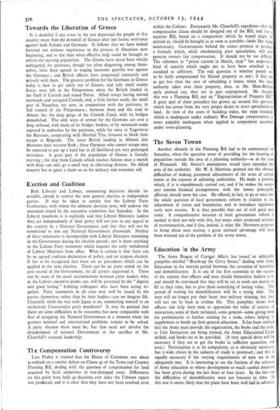Towards the Liberation of Greece
It is doubtful if any event in the war depressed the people of this country more than the downfall of Greece after her heroic resistance against both Italians and Germans. It follows that we have looked forward not without impatience to the- process of liberation now beginning, and to the time when effective help could be brought to relieve the starving population. The Greeks have never been wholly subjugated, for partisans, though too often diagreeing among them- selves, have been agreed in waging incessant guerilla war against the Germans ; and British officers have cooperated constantly and actively with them. The greatest problem for the Germans in Greece today is how to get safely out of Greece, and only small enemy forces were left in the Peloponnese when the British landed in the Gulf of Corinth and seized Patras. Allied troops having moved eastwards and occupied Corinth, and, a little farther south, the small port of Nauplion, are now, in conjunction with the partisans, in full control of the Peloponnese ; between them and the road to Athens lies the deep gorge of the Corinth Canal, with its bridges demolished. 'The only ways of retreat for the Germans are over a long railroad, with many of its bridges broken, or by mountain roads exposed to ambushes by the partisans, while far away in Yugoslavia the Russians, cooperating with Marshal Tito, threaten to block their escape at Belgrade. The latest British landing in Albania also threatens their western flank ; those Germans who cannot escape may be expected to put up a hard but in all likelihood not very prolonged resistance. A great part of the population of Greece is literally starving ; the ship from Canada which reaches Athens once a month "with flour can only go a small way in alleviating distress. No Allied country has so great a clairri on us for military and economic aid.


























 Previous page
Previous page